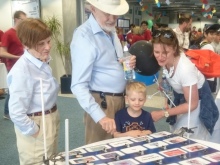Festival-goers join the fight against superbugs

Visitors to Imperial Festival (6-7 May) will play the role of the "Infection Investigator" in an interactive game.
The Superbug Zone will host the cross-disciplinary EMBRACE team, who are looking at ways to tackle Antimicrobial Resistance (AMR) – the ability of microbes becoming resistant to medicines, such as antibiotics.
“Infection Investigator”, an interactive choice-based game, aims to help visitors to the Imperial Festival understand and contribute to the fight against superbugs. In the game, visitors will apply given biological information to solve medical questions.
 The game is designed so that the correct combinations of answers complete electrical circuits to power lights and motors – providing visual real-time feedback on their decisions, which will result in the participant being able to spot infection symptoms and to identify the name of the disease and the pathogen responsible.
The game is designed so that the correct combinations of answers complete electrical circuits to power lights and motors – providing visual real-time feedback on their decisions, which will result in the participant being able to spot infection symptoms and to identify the name of the disease and the pathogen responsible.
The ‘Infection Investigator’ will then be able to determine the appropriate treatment for that infection, and learn where to seek appropriate healthcare.
The game focusses on the three main types of pathogen responsible for many common infections (viruses, bacteria and fungi), and some fun facts about the differences between these microorganisms are provided.
The aim of this game is to increase awareness of antibiotic misuse
– Dr Dominic Affron
Research Associate
The game has been designed to represent how the three Faculties (Medicine, Engineering and Natural Sciences) involved in the EPSRC (Engineering and Physical Sciences Research Council) funded EMBRACE program are combining to tackle problems associated with AMR.
Dr Dominic Affron, one of the research team behind the ‘Infection Investigator’ game, said:
“AMR could have a devastating effect on our lives, but fortunately all of us can contribute to stop this. The aim of this game is to increase awareness of the different types of infection, and what treatments are appropriate for each.
“For example, there is a common misconception that antibiotics can be used to treat viral infections, such as the common cold and flu. Reducing this kind of unnecessary use of antibiotics is an important step in tackling the emergence of antibiotic resistance, which is estimated to cause 700,000 deaths per year worldwide – and this number is rising.”
About the Superbug Zone
Microbes rule the world. Constituting some of the earliest forms of life, today they represent the vast majority of living things on our planet by number of individuals. In fact these microorganisms are so numerous, finding homes in almost every niche on the planet, that despite their tiny size, they still represent over half of life on Earth by weight.
At Imperial Festival, the Superbug Zones will take visitors on a journey into this world of micro-life. The zone will run at Imperial Festival on Saturday 6 and Sunday 7 May.
Science and creativity: About Imperial Festival
Imperial Festival, the College's free annual festival is back, giving the public an opportunity to go behind-the-scenes and explore the latest research. It will run on Saturday 6 and Sunday 7 May at our South Kensington Campus.
The Festival has something for all ages to enjoy, from live interactive experiments, new technology demonstrations, in-depth talks, lab tours, musical and dance-based performances, and creative workshops s within zones themed around Robots, Superbugs, Health & Body, the Future, and Energy and Environment.
Article supporters
Article text (excluding photos or graphics) © Imperial College London.
Photos and graphics subject to third party copyright used with permission or © Imperial College London.
Reporter
Dominic Affron
Education Office